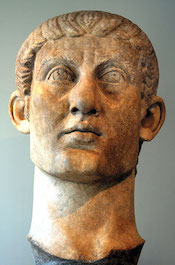Constantine the Great
- JOHN JANARO
Every conversion story is "great."
 Because conversion is accomplished through the supernatural grace of God, who touches people's lives through the miracle of Christ's humanity living in the Church.
Because conversion is accomplished through the supernatural grace of God, who touches people's lives through the miracle of Christ's humanity living in the Church.
Some conversions claim "greatness" in another sense, namely, in their impact on the larger narratives of temporal human history. In this latter respect, few have had a "greater," more extensive and enduring significance than that of Flavius Valerius Aurelius Constantinus.
He was born in a Roman military outpost in the Balkans around the year 272. His father was a general and his mother a woman of humble origins. The newborn Constantine seemed destined for nothing more than a career in the Roman army, but the late 3rd century was a period of political instability and innovation. Constantine's fortunes rose with those of his father, Constantius, whose successes in the field led to his elevation to political power. Constantius became "Caesar of the West" in Emperor Diocletian's complicated attempt to reshape imperial authority into a "tetrarchy."
Young Constantine was stationed at Diocletian's court in Asia Minor, where he saw the emerging rivalries and the overall disordered and violent imperial atmosphere (which included a decree for the total suppression of Christianity in the East in 302). Constantine managed to transfer to the West to join his father's legions in Britain. When Constantius died in 306, his formidable army proclaimed his son Western emperor. As the imperial "tetrarchy" imploded, Constantine largely avoided the raging controversy regarding who was emperor of what and continued winning victories and solidifying the frontier in the West.
Constantine knew the value of unity, however, and his aspirations grew with success. As his army crossed the Alps and entered Italy, it became clear that Italians despised his imperial rival Maxentius as a tyrant. Constantine willingly took upon himself the cause of "liberator" and headed toward Rome.
Constantine was generally "religious," in the style of late antiquity. Like many in the military, he was devoted to Sol Invictus, the divine life-giving power symbolized by the sun. This symbolism proved to be significant for a mysterious event that took place sometime during the army's approach to Rome. Constantine saw a vision of the sun mounted by a cross, with the words "by this sign, conquer." Eusebius reports that he then had a dream in which Jesus appeared to him and told him to mark the standards of his army with the luminous symbol containing the first two Greek letters of the word "Christ" (PX).
We know that the chi rho symbol dates from Constantine's time and is found on some of his coins. We also know that his army beat Maxentius and he entered Rome victorious in October of 312. The connection between these events and the personal conversion of Constantine is harder to discern. It's reasonable to infer that something had begun within him. He declined to offer victory sacrifices to the ancient gods, and in 313 he promulgated the Edict of Milan, which ended all persecution of Christians. Thereafter he supported building churches in Rome and throughout the empire. However, he was not baptized until a few days before his death in 337, and his long reign as emperor was not without its complications.
Nevertheless, he did convert over the course of those years, and through his conversion, faith in Jesus Christ began to give new shape to an old and dying civilization.
 This is Meaghen Gonzalez, Editor of CERC. I hope you appreciated this piece. We curate these articles especially for believers like you.
This is Meaghen Gonzalez, Editor of CERC. I hope you appreciated this piece. We curate these articles especially for believers like you.
Please show your appreciation by making a $3 donation. CERC is entirely reader supported.

Acknowledgement
 John Janaro "Constantine the Great." Magnificat.
John Janaro "Constantine the Great." Magnificat.
Reprinted with permission of Magnificat.
The Author

 John Janaro is Associate Professor Emeritus of Theology at Christendom College. He is a Catholic theologian, and a writer, researcher, and lecturer on issues in religion and culture. He is the author of Never Give Up: My Life and God's Mercy and The Created Person and the Mystery of God: The Significance of Religion in Human Life. He is married to Eileen Janaro and has five children.
John Janaro is Associate Professor Emeritus of Theology at Christendom College. He is a Catholic theologian, and a writer, researcher, and lecturer on issues in religion and culture. He is the author of Never Give Up: My Life and God's Mercy and The Created Person and the Mystery of God: The Significance of Religion in Human Life. He is married to Eileen Janaro and has five children.




